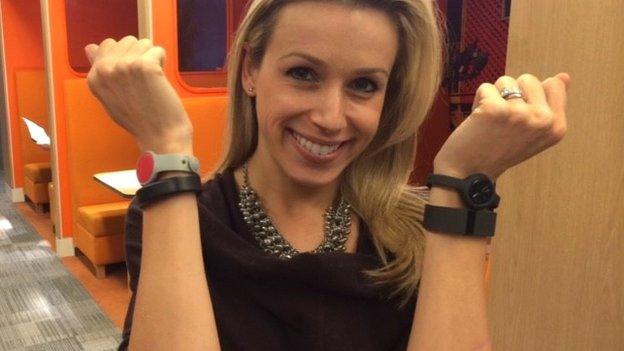'No proof' fitness trackers promote weight loss
- Published

Wearing an activity device that counts how many steps you have taken does not appear to improve the chances of losing weight, research suggests.
The two-year long study in the Journal of the American Medical Association (JAMA) included nearly 500 overweight volunteers who were asked to diet and take more exercise.
Half were given a fitness tracker to help them keep tabs.
This group had lost less weight than the other one by the end of the trial.
The study authors say this does not mean people should ditch the technology altogether, but neither should they put too much faith in them, at least as a slimming aid.
Manufacturers say that the technology has moved on since the study, and that their own research suggests activity trackers can help with weight loss alongside diet and exercise regimes.
Gimmick?
Despite the popularity of activity trackers, there have been very few studies to see what actual impact they have on weight and fitness levels.
The University of Pittsburgh research is one of the first randomised trials to gather such evidence.
The investigators found that over the course of the study, the volunteers who wore the fitness trackers had lost, on average, about 8lb (3.6kg).
In comparison, the control group that were not given these devices lost about 13lb (5.9kg).

Dr Jakicic says he had expected the devices would boost weight loss
The study authors say there are many possible explanations for this surprising finding but, as yet, no proof.
Lead researcher Dr John Jakicic said: "People have a tendency to use gadgets like these for a while and then lose interest with time as the novelty wears off.
"And we did see a drop off in the usage data as the study went on."
Perhaps people who use fitness trackers became fixated on exercise goals and forgot to follow the diet advice, Dr Jakicic suggested.
"You might think to yourself, 'I'm being so active I can eat a cupcake now,'" he said.
Dr Jakicic said he would like to explore if certain people were more likely than others to benefit from using the technology.
For example, a person who was very goal-driven might find tracking their exercise regime very motivating. - but others might just find it depressing.
"It might be very discouraging if you can see that you are not hitting your target all the time," he said.
He acknowledged that technology had moved on since the study began, but he did not think that would alter the findings.
"What these devices tell us and how we use the information has not changed," he said.
According to research company CCS Insight, UK sales of wearable devices - activity trackers and smart watches - are expected to reach five million, with 10 million devices expected to be in use before the end of 2016.
Dr David Ellis, a psychologist at Lancaster University, who has been researching the rise of consumer health wearables said the JAMA study was helpful because it focused on people who might not normally go out and buy an activity tracker.
"Fitness trackers are more likely to be bought by people who already lead a healthy lifestyle and want to monitor their progress. So it's hard to say if they are useful for everybody," he said.
"In real life, obviously, most people won't get the level of support to lose weight that the people in this study did.
"They would have to do it on their own, so wearing a device might be better than nothing. We just don't know."
Follow Michelle on Twitter, external
- Published10 February 2015

- Published17 June 2015
